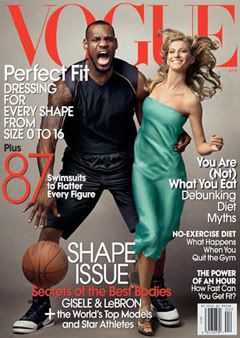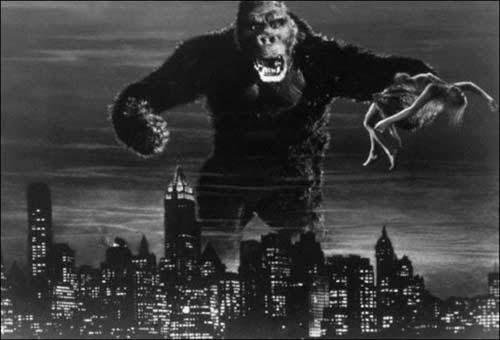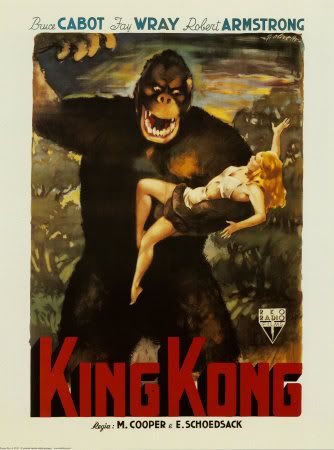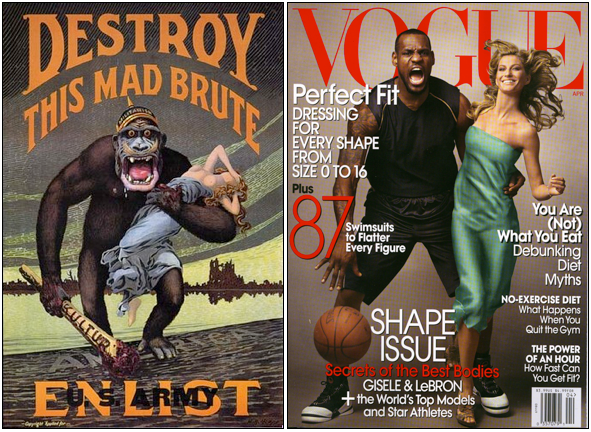Young'uns out there who haven't taken film courses might not be familiar with the actual plot of King Kong, released in 1933 (not beyond "big gorilla climbs Empire State Building with woman in hand," anyway) let alone with any analysis of its racist imagery. For a primer on both, let me point you to David N. Rosen's article "King Kong: Race, sex, and rebellion."
It doesn't require too great an exercise of the imagination to perceive the element of race in KING KONG. Racist conceptions of blacks often depict them as subhuman, ape or monkey-like. And consider the plot of the film: Kong is forcibly taken from his jungle home, brought in chains to the United States, where he is put on stage as a freak entertainment attraction. He breaks his chains and goes on a rampage in the metropolis, until finally he is felled by the forces of law and order.
The causative factor in his capture and his demise is his fatal attraction to blonde Ann Darrow (Fay Wray). As Denham says in the last words of the film, “Oh, no, it wasn't the airplanes. It was Beauty killed the Beast.” If we look at KING KONG in terms of a racial metaphor, “Beauty” turns out to be “the white woman.” ...
Aside from the sexual aspect implicit in the question of race, there’s the more direct, and somewhat delirious, sexual imagery in the film. The ape often functions as a most appropriate anthropoid symbol of “lower,” “animal” instincts. In this case we have a giant ape (literally a huge, hairy monster) and his unrestrained, headlong pursuit of a “blonde,” that archetypical Hollywood sex-object, ending on top of the world’s foremost phallic symbol.(1) The sexual theme touches on the standard racist myth of the black male’s exaggerated sexual potency, and the complementary notion of his insatiable desire for white women.
Emphasis mine. Any questions? Good.
Now, let's have a look at that cover.

And at Kong:


And for good measure, check out this old U.S. Army recruitment poster (H/T Jill at Feministe):
 Any questions? GOOD.
Any questions? GOOD.I first became aware of the Vogue cover the first time Jill blogged about it, two weeks ago, and like her, I probably wouldn't have noticed anything without having it pointed out to me. But as soon as it was pointed out to me, I saw the screamingly clear Kong echo--and since I did study King Kong in a film class many years ago, I was well aware of the racist underpinnings of that story and its imagery. So it didn't take long for the penny to drop.
Some people, though, are still not only not getting it, but insisting that those of us who do get it are hypersensitive, overreacting, "looking for racism everywhere," etc.--the usual, in other words. For the most part, I can just roll my eyes at that, because it's all so familiar. Anything short of someone saying on national TV, "If you see a black man, you should shoot him in the face, and let me be perfectly clear that I mean you should shoot him in the face because he is black," might not be racism after all, because some white people can't see it. And if not all white people can see it, then the benefit of the doubt should automatically go to whomever made the racist statement/took the racist action/produced the racist image, not to the people identifying it as racist--because there is NOTHING WORSE IN THE WORLD than being a white person unfairly accused of racism! You lucky people of color have NO IDEA how horrible that is!
Like I said, the usual. But Wesley Morris at Slate has thrown a new twist into that argument. He (sort of) lays out the argument in favor of the Vogue cover being part of a long tradition of racist imagery depicting black men as primal brutes coming after white women, so he obviously gets it, but then follows that up with, "But even typing that just gave me a headache."
The problem, you see, is not that it isn't racist--it's that all these discussions of racism are boring him.
I, for one, have racism fatigue. I'm wiped out. Between the outrage over Obama's Jeremiah Wright problems and Bill Clinton's unbelievable mutation from American's first black president into Karl Rove, I don't have the bandwidth to fight Anna Wintour. Seeing that cover as purely racist doesn't give the people looking at it enough credit. It dates Vogue for relying on the allusion but it also dates us for going crazy over it. Racial hysteria is the old black.
Now, here's the other twist: Wesley Morris, despite sounding exactly like a textbook example of white privilege in that passage, is not white. Which means, of course, to some of his readers, IF HE DOESN'T CARE ABOUT IT, IT'S NOT A PROBLEM! SEE! HA! TAKE THAT, ALL YOU P.C. HYSTERICS! (See also: Charlotte Allen and sexism.)
You know, on the one hand, I can actually empathize with Morris. There's a part of me that has "sexism fatigue" these days, because I am so fucking sick and tired of explaining to people why the attacks on Hillary Clinton, 9 times out of 10, are not just about her politics. 8 gazillion people sent me links to stories about Miss Bimbo this week, and I've chosen not to write about it because, well... maybe I just don't have the "bandwidth" to fight sexism in video games right now.
But do you see what I did there? I chose not to write about it--instead of choosing to write an article in which I dismiss other people's concerns and announce that I am tired of all this talk about sexism, and those who focus on the sexist aspects of sexist things are failing to give people enough credit. We can't all address every instance of bigotry in the world, and for those of us who are frequently asked to address specific brands of it, it can get fucking tiring. But when you get tired, the thing to do is take a break, not tell other people to shut up and focus on more important things. It's all important, from the most subtle instances to the most blatant and institutionalized.
And it can be especially important to talk about the subtle things, because that's where privilege reveals itself most clearly. Any white person who's neither an idiot nor an asshole can see and deplore the racism in, say, this image. But we can't all see it in the Vogue cover. So when we start talking about the Vogue cover as part of a long tradition of racist imagery that casts African-American men as aggressive apes, we get a much more useful conversation going. Instead of just a bunch of white liberals saying, "That's horrible!" and a bunch of white supremacists saying, "No, it's right on!" we get to see all the grey areas of privilege brought out in the open: those of us who try to be anti-racist and educate ourselves accordingly but still missed the racism there until it was pointed out to us; those of us who sorta see it once it's pointed out but still think people are making a mountain out of a molehill; and most importantly, those of us who missed it in the first place and, on the basis of that, continue to insist it is not there.
We've been talking a lot around here recently about that last category of people, with regard to sexism. And as a woman and a feminist, I can tell you those people are FUCKING INFURIATING. The people who actually live as the subjects of discrimination and hatred are not oversensitive; we are sensitized to the more subtle manifestations of those things, because we've seen how they're wielded against us, over and over and fucking over. So many people have trouble grokking the concept of "privilege" and will respond to having their own pointed out with laundry lists of the disadvantages they've experienced in their lives. But privilege, in this sense, is not just about obvious advantages. It is about the luxury of not seeing the subtle shit.
As a white person, I haven't been sensitized to covert racism by a lifetime of experiences. Unlike a person of color who has no choice but to see and feel it every day, I actually do have to "go looking for it"; my privilege could otherwise allow me to go through life believing it doesn't exist. Because I care about being anti-racist, I do go looking, do make an effort to educate myself about patterns of racism I wouldn't automatically recognize--and to question myself when my kneejerk reaction is, "Oh, come on--I'm supposed to believe that's racist?"
But because I'm white, I also have the option of not looking any time I don't feel like it. That's what privilege is. It's the option to ignore nasty shit that doesn't directly affect my own life, my career, my relationships, my bank account, my social standing, my housing situation, etc. And I won't lie to you--I take that option plenty. I have not publicly flipped out about racism directed at Obama the way I have about sexism directed at Clinton. I had not given all that much conscious thought to making sure people of color feel welcome at my blog or within the movement it partially represents, until it was pointed out to me that many didn't. I haven't written jack shit about LGBTQ issues in I don't know how long, despite being an ally in my own mind. I spend most of my activism energy on feminist issues and fat issues, things that affect me directly.
And you know, I don't even feel guilty about some of that. Each one of us can only do so much, and I'd wager most of us spend more energy on things that affect us directly than on things that don't. Even among those things, we pick and choose. I blow off Miss Bimbo. Wesley Morris can't be arsed to care about King James as King Kong. Charlotte Allen neglects to think about... anything. In the big picture, that's fine. No one has to save the world single-handedly.
But those of us who care about social justice have no excuse for not being aware of issues that don't affect us directly, or for not taking people seriously when they tell us something that's hidden behind the screen of our own privilege really is there. None of us has an excuse for wanting to maintain that privilege regardless of whom it hurts. And for my money, there is no better education in privilege for those who need one--and that includes all of us who have it, no matter how many times we've read "Unpacking the Invisible Knapsack"--than these heated conversations about the more subtle forms of racism, sexism, homophobia, transphobia, sizeism, ableism, what-have-you. Because that's when it really comes out. That's when people start making the "I don't see it, so IT IS NOT THERE" arguments, and the "You people are just looking for things to get pissed about!" arguments. There's a lot to be learned from those.
I don't have to go looking for instances of sexism and sizeism to get pissed off about; I'm a fat woman, so they find me. But I do look for instances of other forms of bigotry, because in so many cases, if I don't look, I won't see them. And those of us with privilege need to look. So the problem with a Wesley Morris telling us certain instances of racism should be beneath our notice, or a Charlotte Allen telling us pretty much all of sexism should be, is that it gives those who really need to look a handy excuse not to. And it's a hell of a lot easier to look for excuses not to care than to look at experiences outside our own.
That Vogue cover is bloody well a call-out to King Kong, and Kong himself is bloody well a profoundly racist metaphor. And it bloody well matters, even if there are more important things to think about. Even--especially--if you "just don't see it." I can totally understand Morris being too worn out to challenge Anna Wintour, but for fuck's sake, dude, if the rest of us aren't? Don't tell us to shut up about it. Because one thing a lifetime of experience as a white person has taught me is that a whole lot of white people love little more than being let off the hook by a Bona Fide Person of Color. You don't think I need to care about this? And you're not white? HALLELUJAH! Hey, I've totally got racism fatigue, too, my brother, let me tell you! Nobody's got it worse than me!
It's one of the many ways our privilege gets reinforced. And that matters in the big picture, even if one stupid magazine cover doesn't.




Shakesville is run as a safe space. First-time commenters: Please read Shakesville's Commenting Policy and Feminism 101 Section before commenting. We also do lots of in-thread moderation, so we ask that everyone read the entirety of any thread before commenting, to ensure compliance with any in-thread moderation. Thank you.
blog comments powered by Disqus